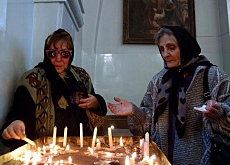
Church concerned about Iran’s Christians

A Swiss Catholic Church delegation, which has just returned from a week-long visit to Iran, says Christians do not enjoy religious freedom in the Islamic country.
The ten-strong delegation found that Christian minorities in Iran were free to practise their religion but could only do so within their own communities.
“On one side they are happy to live in a country where they can practise their faith. They can organise mass, they can pray and they can have churches,” said Mario Galgano, spokesman for the Swiss Bishops Conference.
“But the problem is they cannot do more than this. They cannot speak about their faith outside their community. They don’t have freedom of religion.”
As a result most Iranians knew little of Christianity and other religions, added Galgano. The delegation, which was led by Pierre Bürcher, assistant bishop of Lausanne, Geneva, Fribourg and Neuchâtel, also met representatives from Iran’s Jewish community.
Galgano told swissinfo this meeting had revealed little but he expected more to come out at this week’s “Doha Trialogue” in Qatar between Middle Eastern Christians, Jews and Muslims, which Bürcher is attending.
The visit by members of the Swiss Bishops Conference’s “Islam Committee” followed an invitation from Iran’s Islamic Culture and Relations Organisation (ICRO). As well as meeting representatives from Christian minorities in Iran, the Swiss delegation also visited holy sites such as the Imam Mosque in Isfahan.
Political crisis
The church spokesman said the current political crisis over Iran’s nuclear aspirations and the controversy over the Mohammed caricatures had come up in discussions. He said Iranians had also been anxious to find out what people in the West thought of Iran.
“The political situation is tough and they know this – it is not a secret there. They know about the problems in Iraq and the Palestinian territories, and they don’t want a third conflict in the region. They want peace,” he said.
“A lot of Iranian journalists asked us about our reaction to the Mohammed caricatures,” added Galgano.
“We explained our position that caricatures about religious issues should respect the sensibility of religious faith. But on the other hand we explained that we have liberty of speech and this is very important not only for Switzerland and the West, but also for every country.”
The Swiss Bishops Conference has announced that a book is to be published in Iran in Farsi and English containing speeches from this month’s trip and from the visit to Switzerland by ICRO members in September.
Once the book is released, Galgano expects further meetings between Swiss Catholics and Iranian Muslims.
“I think it is too early to say that we are closer to a better understanding between Christians and Muslims,” he said. “These were just the first steps and we must continue the dialogue towards the final goal of peace.”
swissinfo, Adam Beaumont
The week-long visit by a ten-strong delegation from the “Islam Committee” of the Swiss Bishops Conference followed an invitation from Iran’s Islamic Culture and Relations Organisation (ICRO).
Members of the Iranian body spent several days in Switzerland in September when they were offered an insight into the Swiss religious situation.
A book containing speeches from both visits is to be published in Farsi and English, and distributed in Iran.
Muslims represented 4.3% of the Swiss population in 2000 – up from 2.2% in 1990.
Most come from the Balkans or Turkey, and are Sunnis.
Most Iranians are Muslim: 90% belong to the Shi’ite branch of Islam, the official state religion, and about 9% belong to the Sunni branch (many of whom are Kurds).
The remainder are mainly Bahá’ís, Mandeans, Zoroastrians, Jews and Christians.

In compliance with the JTI standards
More: SWI swissinfo.ch certified by the Journalism Trust Initiative
















![The four-metre-long painting "Sonntag der Bergbauern" [Sunday of the Mountain Farmers, 1923-24/26] had to be removed by a crane from the German Chancellery in Berlin for the exhibition in Bern.](https://www.swissinfo.ch/content/wp-content/uploads/sites/13/2025/12/01_Pressebild_KirchnerxKirchner.jpg?ver=855f1d9f)













You can find an overview of ongoing debates with our journalists here . Please join us!
If you want to start a conversation about a topic raised in this article or want to report factual errors, email us at english@swissinfo.ch.